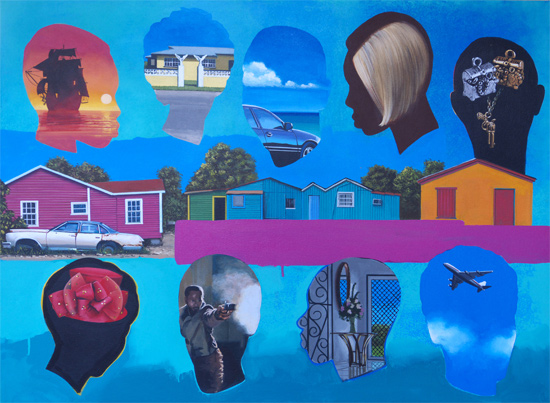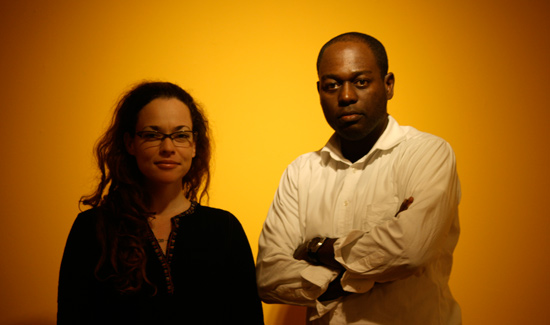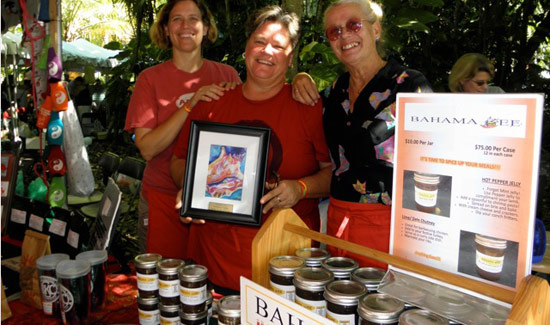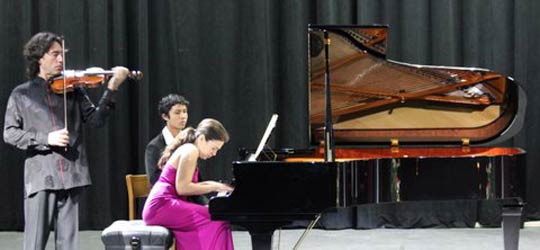 Under the patronage of Governor-General Sir Arthur Foulkes, the Nassau Music Society’s 2011 – 2012 Season Opener featured Russian-born internationally-acclaimed performing artists Dmitri Berlinsky, violinist, and Elena Baksht, pianist.
Under the patronage of Governor-General Sir Arthur Foulkes, the Nassau Music Society’s 2011 – 2012 Season Opener featured Russian-born internationally-acclaimed performing artists Dmitri Berlinsky, violinist, and Elena Baksht, pianist.
The youngest winner in the history of the Paganini International Violin Competition and the recipient of numerous other grand prizes including awards from SONY and Juilliard, Mr. Berlinsky has toured widely in Europe, Russia, the Far East, and the Americas. In recognition of his world-class talent, he has had the pleasure and honor of playing on Stradivarius, Guarneri del Gesu, and Guadagnini violins. He now plays his own 1759 Landolfi violin, whose glorious voice we were most fortunate to hear in this weekend’s concerts. The bow with which Mr. Berlinsky plays is also quite precious, being French and over 100 years old.
Ms. Baksht has a sterling performance background as well, starting with her playing at the tender age of 11 the Bach D minor Piano Concerto with the Moscow Philharmonic Orchestra. Many other triumphs followed as she performed both in Europe and in the U.S., most notably at Lincoln Center and at Carnegie Hall in New York City as well as on radio stations NPR and WQXR. While Mr. Berlinsky and Ms. Baksht met while studying in Russia, their most delightful collaboration to date has resulted in the production of their young son, Daniel, who listened attentively throughout the concerts.
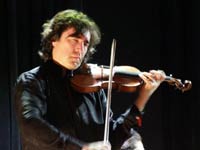
Mr. Berlinsky’s and Ms. Baksht’s program featured 19th and 20th century works by French, Russian, and Spanish composers. They opened the program with Ravel’s Sonata, a work which was reminiscent of Gershwin’s An American in Paris, but which predated it.
In the Allegretto first movement, we hear on the violin the haunting, lilting voice of a young man while on the piano we hear the plaintive sound of chiming bells. Mr. Berlinsky’s vibrato is sheer perfection, just the right amount at just the right moments. The violin sings with an ineffable sweetness, which is interspersed with the piano’s playful contribution as provided by Ms. Baksht’s sparkling technique. The conclusion of this movement was heartbreaking to bursting.
The Blues section of this sonata was an exercise in pizzicato pungency and insouciance. Additionally, Mr. Berlinsky’s sly sliding into pitches brought forth images of boulevardiers (men about town) and flaneurs (idlers). We accompany our young man down darkened streets and alleys, sometimes swaggering, sometimes in a dreamlike trance.
The sonata’s final Perpetuum mobile movement saw the violin’s bow dancing, bouncing, and rocking on the strings to the spinning and top-like whirling of the music. Yet, the many dynamic variations were perfectly planned and executed by Mr. Berlinsky. Like a jazzy flight of the bumblebee, this piece took off and carried the audience along for the gleefully dizzying ride.
The first half of the programme concluded with another work by Ravel. Tzigane was a sprightly gypsy gem, seasoned with just the right amount of rubato and peppery chromatic spice. A solo voice that sang from the heart and cut across the miles and the ages introduced the work, replete with dissonances and flying notes punctuated by pizzicatos and tremolos. Mr. Berlinsky’s flamboyant dance-like, sensual introductory violin section was then joined by Ms. Baksht’s pianistic contribution, evocative of swirling skirts and tambourines. Next we heard the violin’s strutting song that told of the kicking out of legs and the kicking up of heels. The piano then took up the challenge by adding the sound of a concertina to the mix, and the violin concluded with an irresistible dervish-like frenzy and velocity that made gypsies of us all!
The second half of the programme brought us three totally different treasures. Mr. Berlinsky’s and Ms. Baksht’s performance of Chausson’s Poeme Opus 25 was as sensitive as anyone could wish. Played with great finesse by Mr. Berlinsky, the dreamlike reveries that then led us into the violin’s cri de coeur (cry of the heart) were perfect. Ms. Baksht’s exquisite touch and graceful demeanor displayed her contribution to the work to perfection, as we imagined the fluttering of wings, angelic or otherwise. Towards the end of the work, we had a sense of tristesse (sadness) suffused with a plaintive combination of loneliness, resignation, and yet a shadow of hope. To steal a phrase from Proust, there was that sense of “recherche du temps perdu” (in search of lost time), and a soul’s crying out for understanding.
Redemption seemed to come at last as heard in the strength of the chords played so decisively and upliftingly by Ms. Baksht, followed by the piercing sweetness of the violin’s highest voice. But alas, that hope, that exaltation, subsided into a trembling, tearful descent into the return of reality.
Thankfully, Mr. Berlinsky next treated us to Tchaikovsky’s Valse-Scherzo Opus 34, a refreshingly toothsome bonbon designed to elevate our spirits after experiencing the heights and depths of the Chausson Poeme. The Tchaikovsky was shimmering and iridescent, yet there were moments of poignancy not often realized in this work. Still, the primary feeling was one of a skittering buoyancy, perfectly appropriate for a scherzo.
The final work on the programme, de Sarasate’s Carmen Fantasy Opus 25, is an old favorite. After all, who doesn’t love Carmen? To the audience’s unalloyed delight, we heard the familiar strains of the Aragonaise, Habanera, Seguidilla (my favorite, with references to Lillas Pastia), and the Gypsy Dance. The flightiness of our heroine as well as her seductiveness and insolence were well served by Ms. Baksht’s pianistic skill and interpretation. This piece is far from trivial to execute well. Of particular note was Mr. Berlinsky’s perfect intonation of the chromatic sections. He ended the work in a flight of virtuosic fantasy, horsehair filaments flying from the violin’s bow.
In conclusion, Mr. Berlinsky and Ms. Baksht responded to a well-deserved standing ovation with a delightfully engaging encore: Kroll’s Banjo and Fiddle. It was pure froth and fun at breakneck speed, a real crowd-pleaser, as the best encores always are.
As Mr. Berlinsky and Ms. Baksht so aptly stated, music is not a profession but rather a calling. It is something that one can’t not do. We are most fortunate in having such talented and dedicated musicians in Nassau to share their vision and their passion with us.
Submitted by Anita L. MacDonald, MMus, MS, MBA, GPC/MIS

